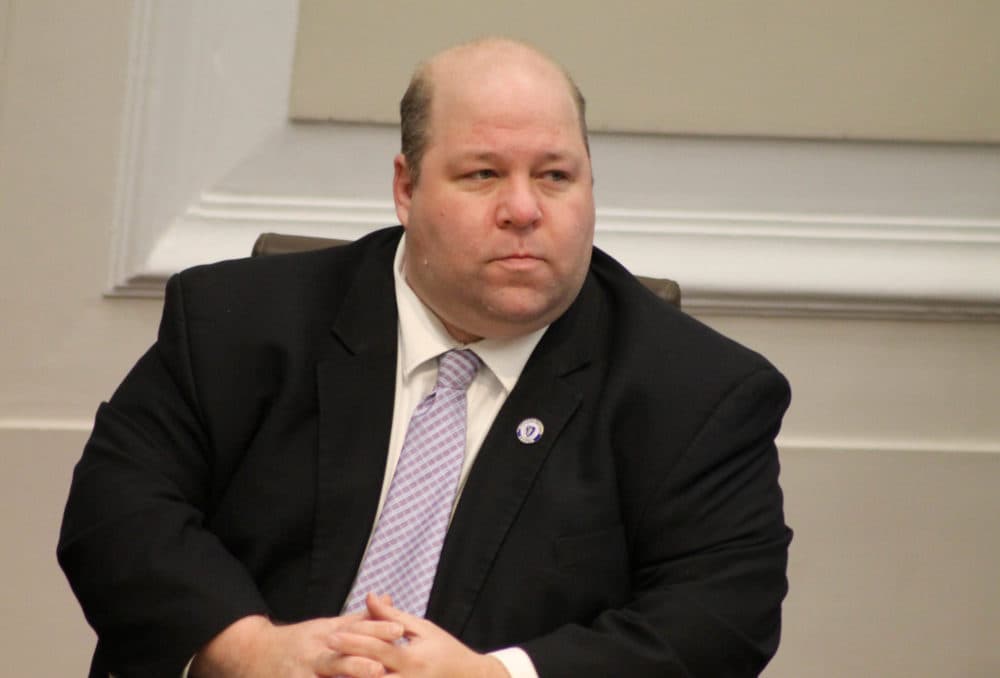Advertisement
Bill Zeroes In On Arming MassArt Campus Police, Despite Resistance From The College's Leaders

With incidents of campus violence becoming all too common at American colleges, the question of whether to put firearms in the hands of campus police at the Massachusetts College of Art and Design came before trustees in February.
The issue had been a controversial topic at the school for years, and despite a number of safety reports clearly recommending that campus police be given firearms, many students and community members remained vocally opposed.
When the time came for the vote, the answer from President David Nelson and the board was equally clear: No guns.
That's why last summer Sen. Paul Feeney, a Foxborough Democrat, filed a bill that would allow the Board of Higher Education to overrule an individual board and require the issuance of firearms and other safety equipment to campus police officers at any state college, community college or public university.
Feeney had heard the case made by the union representing campus police, and agreed that something as serious as public safety on college campuses should not be left to the politics of a particular school.
The bill will finally get a hearing next week before the Joint Committee on Public Safety, which is co-chaired by one of the bill's co-sponsors, Rep. Harold Naughton.
"It's unconscionable to me that with the issues that we have surrounding public safety, especially around campuses, that we would have duly sworn officers that are unarmed. It just doesn't sit right with me," Feeney said in an interview with State House News Service.
On a campus nestled in the city and surrounded by other private institutions like Northeastern University, Simmons University and Wentworth Institute of Technology, MassArt is the only four-year public college in Massachusetts that does not have armed security. In the event of an emergency, the school relies on the Boston Police Department to be its first responder.
While the bill would apply broadly to all public colleges and universities, the clear target of the legislation is the administration of MassArt, which has been at odds with the union representing campus security over the issue of firearms.
Jim Durkin, the legislative director for the American Federation of State, County and Municipal Employees Council 93, said the lack of ability to carry a firearm has led to considerable turnover among MassArt police who do not feel like they can adequately protect themselves or students.
The union argues that campus police are in a much better position to respond to an active shooter or other threat on campus because of their familiarity with facilities.
"The absurdity of this can be summed up by knowing that when they have an active shooter drill they have their officers sheltering in place," Durkin said.
Durkin's union represents over 200 campus security officers at state colleges and universities around the state, including nearly a dozen officers on the MassArt campus. All campus police have gone through the State Police academy and are deputized as special state police officers, with licenses to carry firearms, Durkin said.
Feeney said he doesn't support allowing students, faculty or administrative to carry firearms.
"Let's give the firearms to the people we pay to protect the students and the campus, and those are the campus police officers. It's unfortunate that we have to fix this legislatively, but it appears that we do," Feeney said.
Higher Education Commissioner Carlos Santiago declined to comment on the legislation, but a spokeswoman for the department shared a report produced for the board in 2016 by a group of security consultants, including former assistant secretary of Homeland Security Juliette Kayyem, that recommended the arming of campus police.
A separate Campus Safety Work Group at MassArt reached a similar conclusion in 2018, voting unanimously in favor of arming campus police and providing active-shooter training for the campus community.
The report produced by the group cited the 2016 Board of Higher Education report, as well as reports produced in 2011 by Good Harbor Security Assessment and in 2014 by the consulting firm Azdell-Morgan that also strongly recommended that the college switch to armed police.
The group acknowledged in its final report that not only was MassArt the only four-year state college that remained unarmed, but stated that retaining officers had been difficult and the turnover costs of training new officers when others resign has cost "a great deal of time and money."
It also stated that then-Boston Police Commissioner William Evans supported arming MassArt college police officers.
Current Commissioner William Gross's office did not respond to a request for comment on the Feeney bill or MassArt's position of not arming campus police, and City Hall said Mayor Marty Walsh has not weighed in on the issue.
Following a February vote of the MassArt board not to arm campus police, the union representing the officers took a vote of no confidence in President Nelson.
"This action was taken in response to your opposition to arming our police officers, to what we view as a reckless disregard for the safety of the students, staff, and most importantly, the police officers at the Massachusetts College of Art," president of AFSCME Local 1067 Sheila Kearns wrote.
Kearns also faulted Nelson for what the union considered to be his failure to defend campus officers in the face of sharp criticism from students.
Nelson's office did not respond to a request for comment.
"Every campus has a unique feel. Every school has the authority to run the school as they see fit," Feeney said. "But I think there's a clear line when it comes to public safety, and those issues can become politicized."
Feeney said he believes opposition "comes from a good place," but concluded "I fear that if it's left up to each unique campus board that it becomes politicized, subject to pressure and I don't think we should be playing games with public safety."